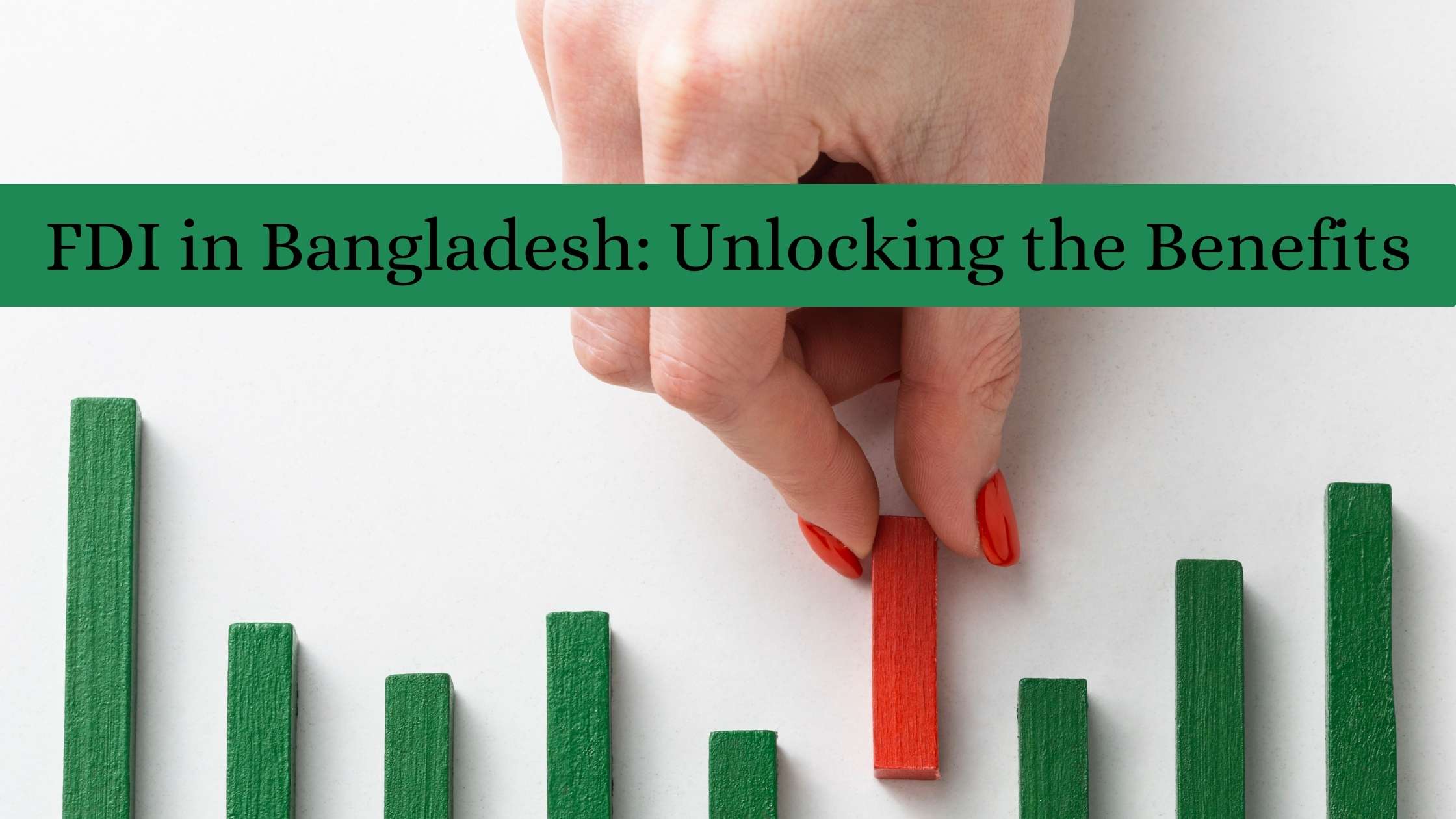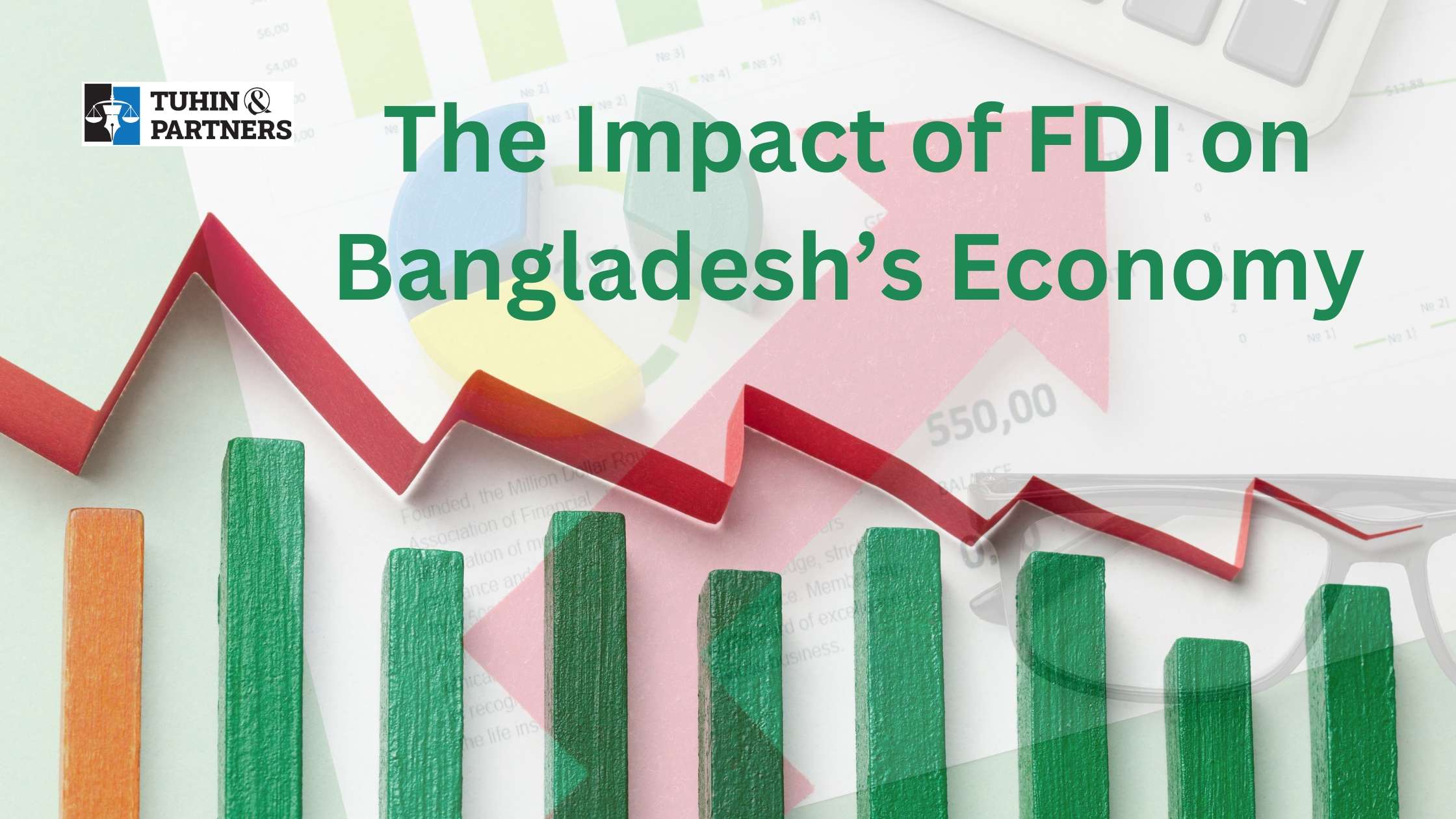Foreign direct investment – FDI in Bangladesh is pivotal in propelling its economic growth and development strategy, reaping significant benefits for the nation. As per Unctad’s World Investment Report 2023, Bangladesh witnessed an impressive surge in FDI, marking a growth of 20.2% to $3.48 billion in 2022, the second-highest inflow in the country’s history. This robust influx underscores Bangladesh’s prowess in attracting foreign investment, setting the stage for unparalleled economic prosperity.
Bangladesh has surpassed its Asian peers, including India, Indonesia, and the Philippines, boasting an average annual GDP growth of 6.4% between 2016 and 2021, outperforming the global average of 2.9%. With a GDP per capita of approximately $2,800 in 2022, exceeding India’s, Bangladesh is poised to attain upper-middle-income status (at least ~$4,000 GDP per capita) by 2031. From 2015 to 2019, Bangladesh’s economy flourished, recording a robust growth rate of 6-8% annually.
Leveraging its demographic dividend, Bangladesh has thrived in crucial sectors such as readymade garment (RMG) exports, remittances, and favorable macroeconomic conditions. FDI remains a cornerstone of Bangladesh’s growth narrative, facilitating the financing of crucial infrastructure projects and generating employment opportunities for the local workforce. This proactive approach to attracting FDI drives domestic development and fosters collaboration and mutual benefit between nations, contributing to global economic prosperity.
In summary, the benefits of FDI in Bangladesh are undeniable, fueling economic expansion, job creation, and sustainable development. As the nation continues to attract foreign investment, it solidifies its position as a beacon of opportunity and growth in the global economic landscape.
Uncover the benefits of FDI in Bangladesh, including job creation, technology transfer, and economic stability
Foreign Direct Investment (FDI) has emerged as a potent catalyst for economic growth, and Bangladesh shines as an alluring destination for global investors seeking to capitalize on lucrative opportunities. The nation’s proactive approach to private sector-led development, liberalized investment policies, and the expansion of infrastructure and services have positioned Bangladesh as a magnet for FDI inflows.
In the fiscal year 2022-23, Bangladesh witnessed a remarkable surge in FDI, with the manufacturing sector spearheading the influx at an impressive $1,315.72 million, closely followed by the power, gas, and petroleum sectors, which attracted $690.59 million. These sectors present many opportunities for foreign investors to establish physical assets, foster job creation, bolster productive capacity, and empower the local workforce with advanced skills.
Foreign investors venturing into Bangladesh secure their financial interests and contribute significantly to the country’s growth trajectory. Extensive studies have underscored the multifaceted benefits of FDI, including the transfer of managerial understanding and technological know-how, the stimulation of local market competition, the creation of modern employment avenues, and the expansion of global market reach for export-oriented industries. With each influx of FDI, Bangladesh edges closer to a prosperous future marked by sustainable growth and development.
Driven by its business-friendly environment, strategic geographical location, burgeoning economy, and skilled human capital, Bangladesh offers a fertile ground for foreign investors to explore and exploit profitable investment prospects. Armed with the right investment strategy and backed by governmental support, foreign investors can realize substantial returns on investment and play a pivotal role in steering Bangladesh towards unprecedented economic prosperity.
Policy Reforms: Benefits Catalyzing FDI in Bangladesh
Bangladesh emerges as a dynamic and rapidly expanding market, offering enticing prospects for foreign direct investment (FDI). With its burgeoning domestic consumer base, rapidly growing middle and affluent class, and impressive digital penetration, the country is primed for exponential growth.
The Government of Bangladesh has embarked on ambitious initiatives, establishing 97 economic zones and 28 national high-tech parks open for FDI. These ventures provide flexible investment options, including land acquisition, joint ventures, and public-private partnerships, ensuring ease and attractiveness for foreign investors to engage.
To bolster these efforts, the government has instituted key regulatory bodies like the Bangladesh Investment Development Authority (BIDA), Bangladesh Economic Zone Authority (BEZA), Bangladesh Economic Processing Zone Authority (BEPZA), Bangladesh Hi-Tech Park Authority (HTPA), and the Public-Private Partnership Authority (PPPA). These entities foster an enabling investment environment and actively solicit FDI into the country.
Furthermore, the government’s commitment to revising industrial policies benefits foreign investors. Tax incentives, profit repatriation, tax holidays of up to ten years, unrestricted work permits for foreign nationals, and access to domestic capital markets are available. Bangladesh’s adherence to international agreements further safeguards foreign investors, instilling confidence in investment decisions.
Investing in Bangladesh presents an excellent opportunity. With the government’s dedication to creating job opportunities in the public sector and fostering private sector growth, investment prospects are virtually limitless. Bangladesh’s untapped potential and impressive economic growth make it an attractive investment destination for foreign investors seeking to capitalize on new opportunities and propel growth.
FDI Benefits: Growing Job Markets
The relationship between employment and economic growth is pivotal, as seen in regions where a surge in employment drives living standards upward, thus amplifying productivity levels and expanding the economy. Foreign Direct Investment (FDI) plays a crucial role in this cycle, fostering local business opportunities and enhancing productivity through establishment in host countries.
Bangladesh emerges as a promising arena for local enterprises and a lucrative prospect for venture capitalists, private equity firms, and multinational corporations seeking strategic expansion. The nation’s strides in augmenting labor productivity and attracting foreign investments underscore its steadfast dedication to progress.

With a youthful demographic dividend and a burgeoning labor force, Bangladesh stands poised to emerge as a prime investment destination while concurrently generating employment avenues. Notably, the nation’s concerted efforts to empower women and integrate them into the workforce exemplify its commitment to a brighter future.
The thriving readymade garment sector, ranking as the world’s second-largest exporter, epitomizes Bangladesh’s vast potential and the boundless opportunities on the horizon. As Bangladesh continues to foster an environment conducive to growth and innovation, its trajectory toward becoming a global economic powerhouse becomes increasingly apparent.
Discover the Mesmerizing Job Market Expansion for FDI in Bangladesh
The most significant chunk of Bangladesh’s exports, more than 80%, comes from a single sector.
– The service sector is predicted to remain the most significant source of employment, with 41.2% of the workforce expected to work in this field in 2021.
– The minimum monthly salary for workers in Bangladesh’s clothing manufacturing sector is 74% and 35% lower than that of China and India, making it an appealing destination for foreign direct investment due to its cost-effective manufacturing advantage over other countries in the region.
– With its capable working-age population, Bangladesh is expected to become increasingly attractive as an outsourcing destination for services, following in the footsteps of India and the Philippines.
Bangladeshi companies faced significant challenges a decade ago. In 2010, the country’s output per worker was only $8,000, about a quarter of the average for low—or middle-income countries (LMICs).
Over the past ten years, Bangladesh’s working-age population has significantly increased, a phenomenon known as the “demographic dividend.”
Tech Transfer Benefits by FDI in Bangladesh
FDI is foreign direct investment, which refers to an investor from one country creating an extended shareholding and substantially influencing a firm located in another economy. Transferring new technologies to host countries is essential to foreign direct investment, contributing to greater productivity and economic growth. Foreign direct investment may involve a company expanding its domestic operations into an international market, vertically ascending the supply chain, acquiring an unrelated enterprise in a foreign country to form a conglomerate, or exporting the produce of its foreign operations to a third nation. Additionally, foreign direct investment is pivotal in driving economic expansion by catalyzing technological transfer across nations and fostering global commerce, thereby enhancing entry into other markets. The remarkable growth trajectory of Bangladesh’s economy during recent years can be attributed to technological innovation, foreign direct investment, trade, and human capital, all of which significantly impact its economic growth. The significant determinants of foreign direct investment (FDI) into a country include the development of information and communication technology (ICT), broad money (money circulation), and gross capital formation. The agriculture sector employed 40.6% of Bangladesh’s labor force and contributed 13.02% to the country’s Gross Domestic Product in 2016-17.
Meanwhile, the manufacturing sector accounts for about 24.18% of Bangladesh’s GDP, with the readymade garment (RMG) industry dominating the manufacturing sector. Bangladesh is the fifth largest garment exporter in the European Union and ranks among the top ten apparel suppliers in the United States. In the past two decades, it has held the second position in textile exports globally, right behind China, with approximately 34 billion dollars earned from exports in 2018-19. Bangladesh is closely linked to technology transfer from advanced countries through trade, foreign direct investment, capital imports, intermediate goods, machinery, and other means to preserve resources for future generations. At the same time, economic and social growth is achieved.
FDI’s Role in Fuelling Economic Growth of Bangladesh
Key to Bangladesh’s economic rejuvenation, FDI embodies a strategic infusion of capital and expertise, fostering sustainable development across various sectors. From infrastructure to technology, FDI inflows inject vitality into the economy, catalyzing innovation and fueling growth trajectories.
Amidst Bangladesh’s pursuit of socio-economic goals, including poverty alleviation, FDI emerges as a pivotal driver, unlocking new avenues of employment, entrepreneurship, and income generation. By fostering a conducive environment for foreign investment, Bangladesh positions itself globally as an attractive destination for capital deployment.
Bangladesh harnesses the potential of FDI, paving the way for inclusive growth. It ensures that investment benefits permeate society, reaching marginalized communities and bolstering livelihoods. Bangladesh embarks on a journey of shared prosperity and sustainable development through strategic partnerships and collaborations with foreign investors.
In essence, the benefits of FDI in Bangladesh extend beyond mere economic gains, encompassing broader socio-economic transformations that lay the foundation for a brighter future. As Bangladesh embraces foreign investment as a catalyst for progress, it charts a course toward realizing its full potential and emerging as a beacon of prosperity in the global landscape.

Foreign Direct Investment (FDI) has played a pivotal role in driving Bangladesh’s robust GDP growth, surpassing 5% over the past two decades, with a remarkable 7.88% surge recorded in 2018, as per World Bank data. FDI inflows, captured under the capital and financial account of Bangladesh’s Balance of Payments (BOP) statement, significantly influence the country’s capital and financial account surplus or deficit, underpinning its economic trajectory.
Studies highlight the profound impact of FDI on Bangladesh’s GDP growth, with a ten percent increase in FDI correlating to a 3.7% GDP expansion. Moreover, a sustained 13% annual growth in FDI holds the potential to alleviate poverty levels by 1%, underscoring the crucial link between FDI and poverty reduction efforts.
Given its transformative economic effects, encouraging FDI growth is a strategic imperative for Bangladesh. By attracting foreign capital, FDI stimulates labor demand, leading to higher wages and enhanced economic opportunities for the populace.
Bangladesh’s strategic positioning and abundant natural resources present vast opportunities for FDI-driven growth, with the potential to achieve an impressive 10% economic expansion by increasing foreign investment to 5-6% of GDP. The manufacturing sector, particularly textiles, and weaving, has emerged as a primary recipient of FDI, accounting for 40.5% of total inflows. Additionally, sectors like power, gas, petroleum, agriculture, fishing, and information technology hold immense promise for future investment diversification, essential for sustaining economic growth.
FDI catalyzes Bangladesh’s journey toward sustainable development, capital formation, and poverty reduction. By leveraging its strategic advantages and diversifying investments across sectors, Bangladesh is poised to unlock its full economic potential and emerge as a beacon of prosperity in the global arena.
Driving Economic Prosperity: The Value of FDI and Its Benefits
Bangladesh has immense potential to become a thriving marketplace. Foreign Direct Investment can create job opportunities, transfer technology, develop infrastructure, and enhance productivity. FDI can diversify industries, increase export potential, and attract foreign expertise and knowledge.

Source: Trading Economics
Foreign Direct Investment (FDI) is vital to countries’ economic growth and development. It is a reliable source of capital that can be utilized for investment in crucial sectors such as manufacturing, energy, telecommunications, and infrastructure. FDI has several benefits that can significantly impact the economy. By creating a steady inflow of foreign capital, FDI strengthens the domestic investment base, stimulates economic activities, and generates employment opportunities. Moreover, FDI brings technological advancements and managerial expertise that can transform local industries. Foreign investors often introduce modern production techniques, research and development capabilities, and efficient management practices, increasing productivity and competitiveness.
FDI also plays a pivotal role in bolstering the economy by enabling local governments to generate more revenue, which can be utilized to fund programs to improve citizens’ welfare. By investing in public services such as healthcare, education, and social welfare, FDI can help reduce poverty and enhance people’s quality of life.
Overall, FDI is an essential tool for fostering economic growth, generating employment, and improving a country’s standard of living. By encouraging foreign investment, governments can create a favorable business climate and attract foreign investors to invest in their country’s potential.
Written by: Tasnim Tarannum Progga
Edited by: Osman Gani Tuhin






















